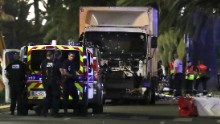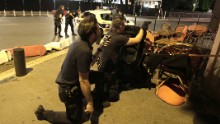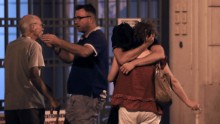Follow @iReporterng

Waves break on the beach below the Promenade des Anglais as clouds gather above the French Riviera city of Nice.
Summer is a busy time in the idyllic French southern port city of Nice. For well over a century, the country's Côte d'Azur -- azure coast -- has been the go-to destination for legions of holidaymakers, first from around the country and now from around the world.
The Côte, known in English as the French Riviera, is a stunning stretch of Mediterranean coastline, comprising Nice, capital of the Alpes Maritimes département, and a smattering of cities including St. Tropez and the glamorous Cannes, famous for its annual film festival. Just 20 kilometers down the coast, as well, is the wealthy principality of Monaco -- long the destination of France's rich and beautiful.
While it shares some of the same beauty -- especially in its coastline -- Nice has always had an edge that its neighbors lack. Pronounced "Neece," it is a friendly, sunny, slightly chaotic city at the best of times.
But now it is marred by a sickening terror attack, perpetrated by an as-yet unknown assailant, on Bastille Day -- one of the most significant days in the French calendar, the country's equivalent of July 4. A truck careened down the coastal Promenade des Anglais, mowing down dozens celebrating the holiday.
The road, one of Nice's main arteries, passes the seafront Nice-Côte d'Azur airport and is the easiest route in and out of the city.
Nice witnesses: It was apparent that it was deliberate
Bastille Day -- France's July 4
On any given day, the promenade is busy. Thursday night it was packed with crowds celebrating Bastille Day. The fireworks had just ended, witnesses said, when the driver of a large truck opened fire into the packed ranks of holidaymakers, then plowed through the crowd, killing dozens.
The national holiday is one of the most important in the French calendar, commemorating the French Revolution and an event on July 14, 1789, when close to a thousand Parisians stormed the Bastille prison, a symbol of the out-of-touch, tyrannical aristocracy.
The event became a symbol of the power of the republican revolutionaries, leading to the overthrow of the Bourbon monarchy and the eventual execution of King Louis XVI and his wife, Queen Marie Antoinette, she of "Let them eat cake" fame.
France's President Francois Hollande made the connection in a speech late Thursday, saying that the day is a "symbol of liberty."
U.S. Secretary of State John Kerry added that the attack was "against innocent people on a day that celebrates liberty, equality, and fraternity" -- the founding principles of the French Republic.
Nice is a cultural treasure-trove and home to the Marc Chagall and Matisse museums. Chagall was French and Russian and lived his final years on the French Riviera. His works can be found throughout the city and the region. The city's opera house, Opéra Nice Côte d'Azur, also sits on the seafront, site of Thursday's attack.
Henri Matisse also spent a chunk of his life here and, in addition to the national museum dedicated to his works, Nice is also home to the Chapelle du Rosaire de Vence -- Rosary Chapel -- which was, by his own estimation, his masterpiece.
Frequent visitors to the city also once included the playwright Anton Chekhov and the philosopher Friedrich Nietzsche, who said of the city:
"To be sure, there can be no more beautiful season in Nice than the current one: the sky blindingly white, the sea tropical blue, and in the night a moonlight that makes the gas lanterns feel ashamed, for they flush red."



Read more
Source: CNN
What do you think? Post your thoughts in the comments below.
To follow us on twitter click @iReporterng
To Like our facebook fan page click iReporter on Facebook
Join Us on BBM Channel Add Pin or click: C00224051
Report News as its UNFOLDS via: ireporterng@gmail.com














No comments:
Post a Comment
Subscribe to our publication. Do not miss out on any information.
Join us on Facebook:
https://facebook.com/ireporterinternational
Follow us on Twitter:
https://twitter.com/ireporterng
Note: Only a member of this blog may post a comment.